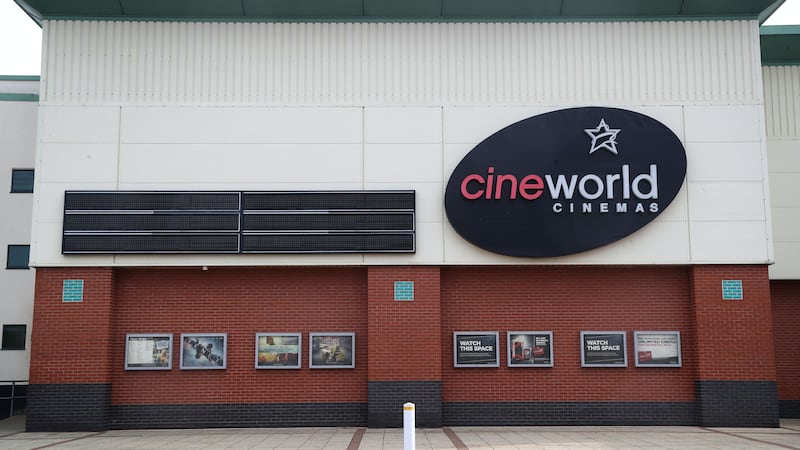The British Film Institute has said it is “deeply concerned” about the challenges facing the cinema industry after shifting movie releases led to the temporary closure of theatres across the UK.
Cineworld announced it will close 127 Cineworld and Picturehouse sites as of Thursday this week, while the picture is similarly bleak in the US.
Cinemas have struggled with a lack of new films after the coronavirus pandemic threw the Hollywood release calendar into chaos.

The industry was dealt another body blow last week when James Bond studios MGM and Universal announced that the franchise’s much-awaited title No Time To Die would be pushed back to April 2021.
And there was further disappointment on Monday when it was announced sci-fi epic Dune was being shifted from a December 2020 launch to October next year.
Ben Roberts, BFI chief executive, said he was deeply concerned by the challenges facing the industry and warned the impact of the release date delays and closures would be felt across the whole sector.
He added: “The BFI will continue to work with the distribution and exhibition sector over this difficult time.
“However, many cinemas across the UK are still open and welcoming audiences. The Government-backed Culture Recovery Fund is giving vital support to struggling independent cinemas in England.”

Mr Roberts reminded customers independent films are still being released in cinemas.
Cineworld chief executive Mooky Greidinger told Sky News they had enjoyed a “very warm welcome from customers” when they reopened after months of closure.
He added: “The studios hesitated and kept on postponing the movies. Many significant movies have moved, like Mulan, like Black Widow… Wonder Woman moved from October to December, and on Friday we got the news that the Bond movie – that, needless to say, for the UK is the biggest movie of the year – also decided to move.”
Citing Christopher Nolan’s Tenet as an example, Mr Greidinger said it had been “very successful internationally and the movie will reach something like 300 million dollars gross in the international market… but I would say also the studios have their side of the story, the investment today of the movies is huge”.
Mr Greidinger also pointed to the fact Los Angeles and New York, the two biggest movie-going markets in the US, remain closed due to the pandemic, putting studios off releasing films.
"I hope to see them very, very soon back at work" – Cineworld CEO, Moshe Greidinger's message to employees.
Read more here: https://t.co/MrvDiYjyDi pic.twitter.com/0N1buOf0k5
— SkyNews (@SkyNews) October 5, 2020
He added: “It’s really difficult to understand how a state like New York can allow indoor dining, allow casinos, allow bowling alleys and many other indoor activities and, on the other hand, saying that cinemas should still wait, and despite the fact we are operating cinemas now around the world for, three to… some of them two months, and we didn’t have any issues with Covid because of the safety precautions that we are taking.
“People are saying to us we feel safe in the cinema so I guess it’s a wrong decision from the studios really to move the movies in such a way.”
Tim Richards, founder and chief executive of Vue International, described the Bond release delay as a “body blow”.
He added in a statement: “The cinema industry is a huge social and economic contributor. It was setting global box office records as we entered the global pandemic and underpins a global ecosystem of studios, distributors, independent filmmakers and landlords.
“It’s the foothold in communities and the commercial driver of retail and eating out operators. While we wait for the blockbusters to return, consumers are clamouring for safe, out of home experiences to support their wellbeing.
“We need governments, studios, landlords and cinema operators to come together to give the public something they need right now – and to be there to support a return to growth in the future.”
Asked on Sky News if Vue would shut any sites, Mr Richards said: “We’re being forced right now to look at options.”
US theatre chain Regal Movies announced on Monday it was suspending operations at all cinemas at close of business on Thursday, citing the “increasingly challenging” landscape.
— Regal (@RegalMovies) October 5, 2020
Among the major Hollywood films to experience a release date delay is Wonder Woman 1984, which will now arrive in December rather than October.
Disney’s live-action remake of Mulan released straight on to streaming platforms instead of hitting cinemas.
Espionage thriller Tenet made more than £5 million at the UK and Ireland box office over its opening weekend on the August bank holiday as it became the first big blockbuster to debut post-lockdown.
At the end of last week, Culture Secretary Oliver Dowden visited one of the 42 cinemas receiving a share of the Government’s £650,000 coronavirus support fund for the independent cinema sector.
The minister shared photos from his visit to Reel Cinemas’ outlet in Borehamwood, Hertfordshire, on Friday, where he was accompanied by members of the BFI.
Prime Minister Boris Johnson has acknowledged there will be “tough times ahead” in the jobs market following the Cineworld announcement, but encouraged people to go to the movies.
Cineworld did not specify how many jobs are at risk in the UK; however, on Sunday, the PA news agency understood that 5,500 would be hit.
Mr Johnson told reporters in central London: “Obviously we hope to reduce, to keep the numbers of people who lose their jobs down as much as we can, but clearly there are going to be tough times ahead.
“That’s why we’ve already invested £190 billion in supporting jobs, livelihoods around the country.
“Supporting local cinemas – I think we’ve already put £30 million in, but what I would say to people is that local cinemas do now have ways of making their shows go on in a Covid-secure way and I’d encourage people to go out to the cinema, enjoy themselves and support those businesses.”








